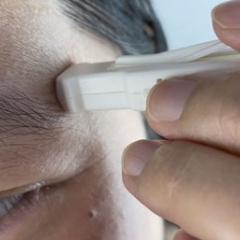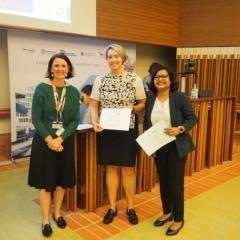iToBoS is a research project funded by European Union's Horizon 2020 research and innovation programme; with an aim to build a new diagnostic tool for the early detection of melanoma, exploiting all the available information of the patient. This holistic assessment tool should understand the specific characteristics of every patient in order to enable a personalized, early detection of melanoma. The project has a duration of 48 months (1 April 2021-31 March 2025) and a total Budget of 12 million Euro.
Skin cancer is the most common human malignancy and its incidence has been increasing in the last decade. Within the general category of skin cancers, melanoma constitutes the main cause of death. According to the latest statistics, cutaneous melanoma is currently the sixth most common type of cancer in Europe, with more than 144.000 new cases diagnosed in 2018.
Fortunately, melanoma may be cured if treated at an early stage. Mortality increases with increasing growth into the skin. More than 90% of melanoma patients are still alive after 5 years, if treated early. If distant spread of cancer cells has occurred (metastatic melanoma), the proportion of patients alive after 5 years may be 23% or lower. For these reasons, rapid diagnosis is essential to ensure treatment is undertaken before local and metastatic spreading occur.
The scope of the iToBoS project is to train an Artificial Intelligence (AI) system able to integrate information from different sources, ranging from dermoscopic images and complete medical records to genomics. iToBoS will develop and validate a new diagnostic device together with an AI cognitive assistant (tool) to empower healthcare practitioners to make comprehensive patient-tailored diagnosis of skin cancer, leading to improved detection rates and highly personalised diagnosis. This new diagnostic tool will utilize the most recent advances in AI to facilitate the usage of any data already obtained with presently available technologies (dermoscopic images) together with the data acquired using the novel hardware proposed in iToBoS. Furthermore, the underlying algorithms will integrate any additional patient information from various sources (e.g. patient medical history, genomics, location of every naevus, age, sex, etc.) with the goal of providing a holistic assessment of individual moles while considering the specific characteristics of each patient. With systematic successive explorations of a patient, the system will be able to also robustly determine the changes occurring in the individual moles, a key feature held as one of the most informative in the detection of skin cancer. The proposed holistic approach will enable physicians to diagnose skin diseases earlier and with higher accuracy, thus increasing effectiveness and efficiency in personalized clinical decision making.
The consortium with 19 partners organizations is led by the University of Girona (Spain). This international consortium brings together leading research/ academic institutions (5 research centres), industries (4 companies and 6 SMEs) and end-users entities (3 hospitals and 1 patients’ NPO): University of Girona (Spain), Optotune Switzerland AG (Switzerland), IBM Israel-Science and technology Ltd (Israel), Robert Bosch España Fábrica Madrid SA (Spain), Barco NV (Belgium), National Technical University of Athens-NTUA (Greece), Gottfried Wilhelm Leibniz Universitaet Hannover (Germany), Fundació Clinic per a la Recerca Biomédica (Spain), Ricoh Spain IT Services SLU (Spain), Trilateral Research Limited (Ireland) Universita degli Studi di Trieste (Italy), Coronis Computing SL (Spain), Torus Actions (FR), V7 LTD (United Kingdom), ISAHIT (France), The University of Queensland (Australia), Szamitastechnikai es Automatizalasi Kutatointezet (Hungary), Fraunhofer Gesellschaft zur Foerderung der Angewandten Forschung E.V. (Germany), Melanoma Patient Network Europe (Sweden).
The UQ Team will contribute to numerous of the project’s Work Packages, and will lead WP10: Acquisition of Clinical Data. The UQ team will test the newly-developed iToBoS machine by collecting unique data from Australian patients, alongside teams in Spain and Italy collecting European data, to compare to current state-of-the-art practices. These data assets include a vast range of imaging data consisting of 2D images, 3D total body images, and dermoscopy images, along with the associated clinical information, questionnaire data and genomic data.
The UQ team includes: Professor H. Peter Soyer, Professor Monika Janda, Associate Professor Liam Caffery, Dr Aideen McInerney-Leo, Dr Brigid Betz-Stablein and Katie Lee.
This project has received funding from the European Union's Horizon 2020 research and innovation programme under grant agreement No 965221.
The UQ Team supported by a NHMRC European Union Collaborative Research Grant (APP2007014).
Contact:
Prof. Rafael García
General Coordinator iToBoS
University of Girona
VICOROB - Computer Vision and Robotics Institute
Mail: rafael.garcia@udg.edu
Maria Machado
Project Manager iToBoS
University of Girona
VICOROB - Computer Vision and Robotics Institute
Mail: mj.cachola@udg.edu



